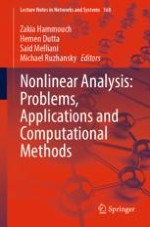This book is a collection of original research papers as proceedings of the 6th International Congress of the Moroccan Society of Applied Mathematics organized by Sultan Moulay Slimane University, Morocco, during 7th–9th November 2019. It focuses on new problems, applications and computational methods in the field of nonlinear analysis. It includes various topics including fractional differential systems of various types, time-fractional systems, nonlinear Jerk equations, reproducing kernel Hilbert space method, thrombin receptor activation mechanism model, labour force evolution model, nonsmooth vector optimization problems, anisotropic elliptic nonlinear problem, viscous primitive equations of geophysics, quadratic optimal control problem, multi-orthogonal projections and generalized continued fractions.
The conference aimed at fostering cooperation among students, researchers and experts from diverse areas of applied mathematics and related sciences through fruitful deliberations on new research findings. This book is expected to be resourceful for researchers, educators and graduate students interested in applied mathematics and interactions of mathematics with other branches of science and engineering.
